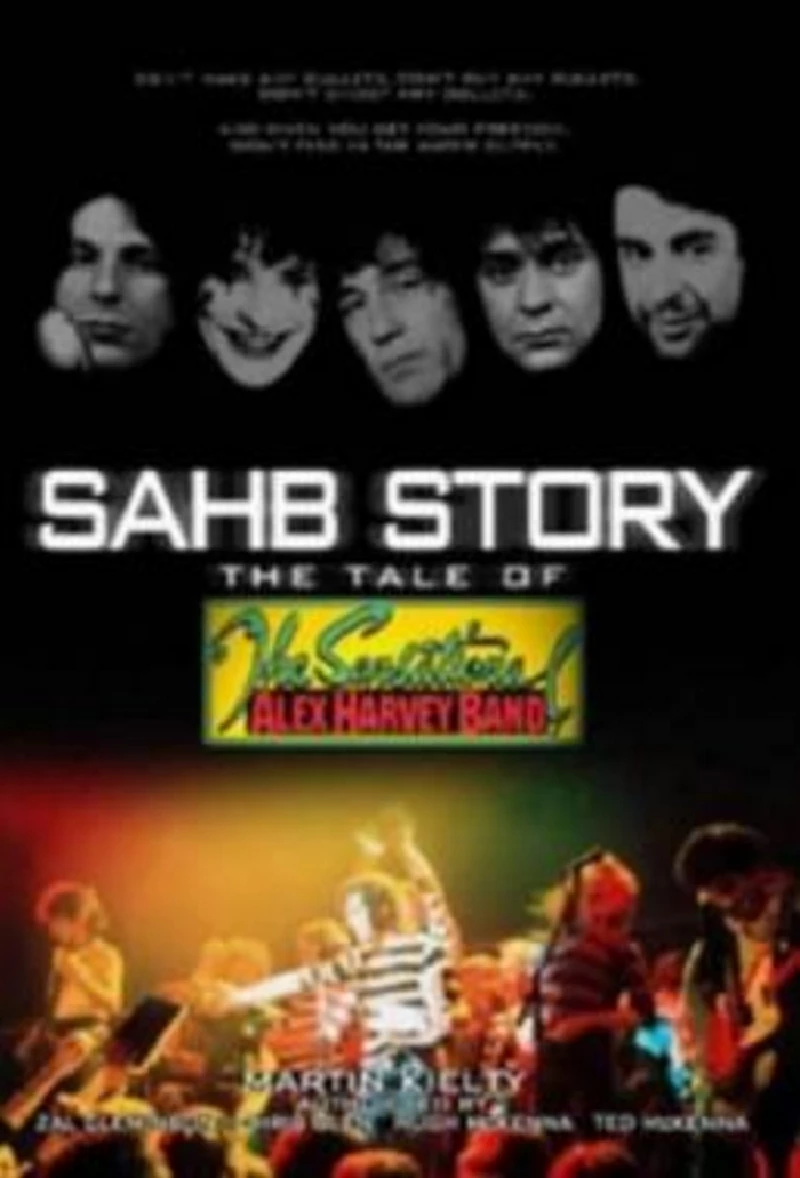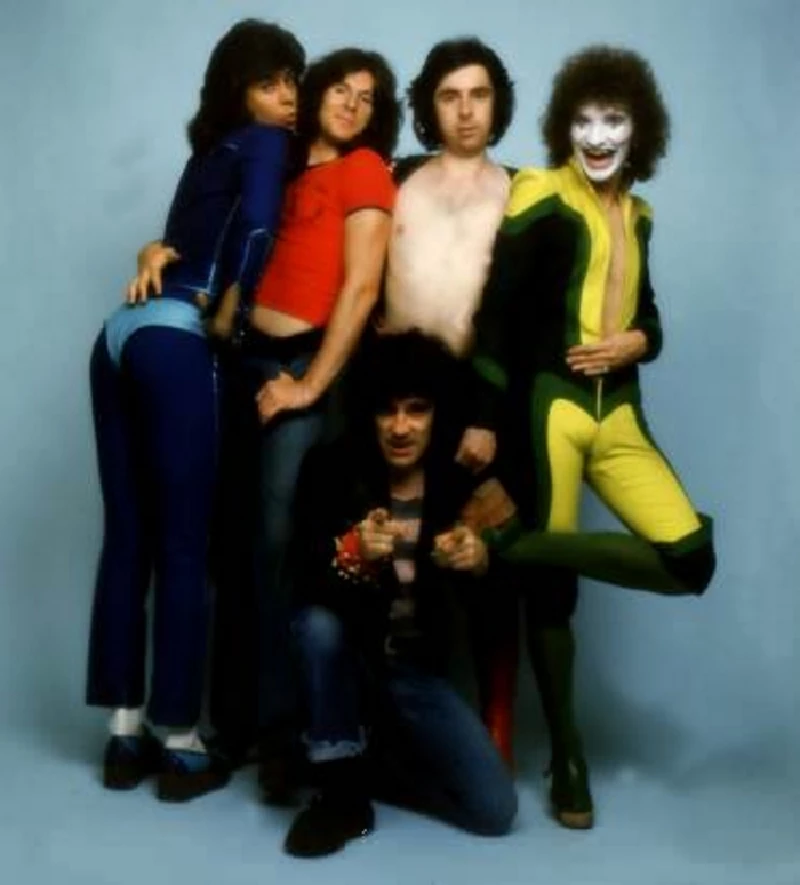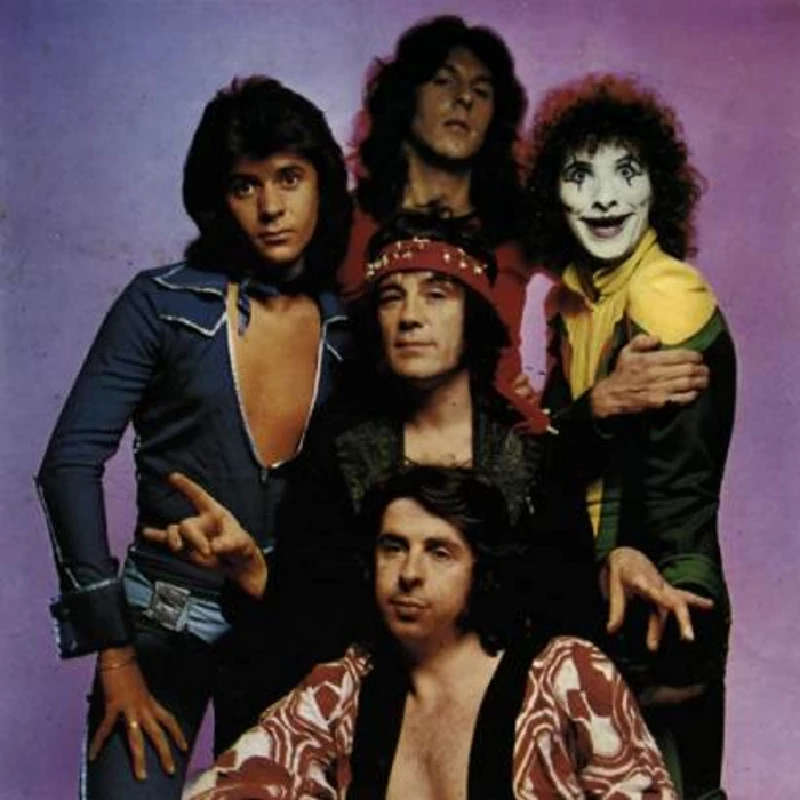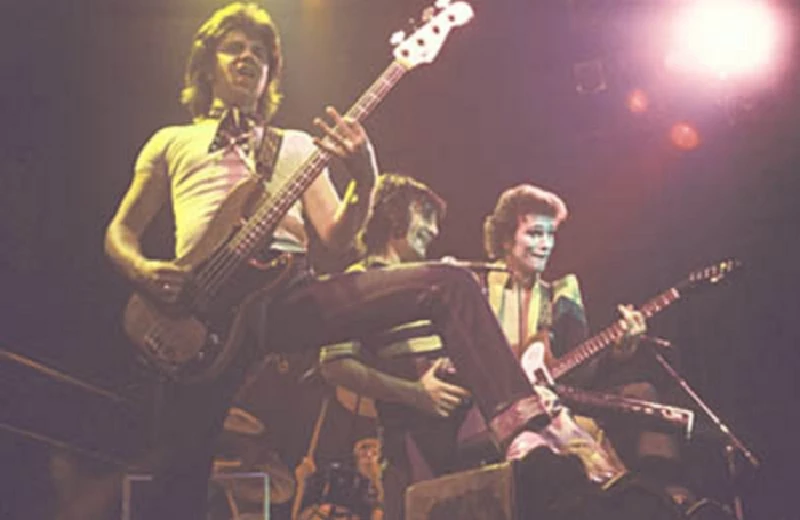Miscellaneous - Interview
by John Clarkson
published: 20 / 3 / 2005

intro
Martin Kielty is the manager of reformed Scottish rockers the Sensational Alex Harvey Band. He is also the author of 'SAHB Stories', a biography of the band. He talks to John Clarkson about the group and his book
In what is an extraordinary coincidence and parallel of fate, Martin Kielty was born on the 29th June 1972, the same day that the Sensational Alex Harvey Band (SAHB) played their first ever gig. Kielty's own career in music has grown and run alongside the Sensational Alex Harvey Band's. He has worked as their webmaster and archivist, was in 2002 and 2003 their co-manager, and since the beginning of 2004 has been their manager. He is also the author of 'SAHB Story : The Tale of the Sensational Alex Harvey Band', a recently published biography of the band, which is authorised by the group's surviving members, Zal Cleminson (guitar), Chris Glen (bass), Hugh McKenna (keyboards) and Ted McKenna (drums). For five years between 1972 and 1977, the Sensational Alex Harvey were, with only the Bay City Rollers to match them, Scotland's biggest-grossing live act, their shows combining their brazen rock riffs with flamboyant street theatre and pantomine. They released during that period eight critically-acclaimed albums. 'SAHB Story: The Tale of the Sensational Alex Harvey Band' tells of that half decade in the spotlight. It begins, however, by telling of the group's colourful frontman, the Glasgow-born Harvey's early years as a 50's pop singer and 60's soul act ; his meeting with Tear Gas, a Glaswegian hard rock band which featured Cleminson, Glen and both McKennas and both acts' subsequent collaboration and re-emergence as the Sensational Alex Harvey Band. It concludes by telling of the mixed fortunes that met its members after SAHB collapsed in 1977 into financial awry when a sick Harvey walked out four days before a European tour ; of Harvey's subsequent decline into further illness and alcoholism and his death from a massive heart attack a day short of his 47th birthday in 1982, and the remaining members' ill-fated attempts to reform the band, first of all in 1993 with second singer Stevie Doherty, and then again in 2002 and 2003 with third vocalist Billy Rankin. Martin Kielty was responsible for pulling together the band's much more successful and much acclaimed "farewell tour"in December 2004, which found them uniting with fourth and final singer, Max Maxwell, and returning to their theatrical roots for the first time since the 70's. Kielty, who is like SAHB based in Glasgow, is also the owner of his own multimedia company, Noisewave. He has played in various bands and was for many years a fanzine writer. With more farewell dates planned, and 'SAHB Story' selling well, particulary in the band's native Scotland, Pennyblackmusic spoke to Martin Kielty about managing the Sensational Alex Harvey Band and his book. PB : How did you first become involved with the Sensational Alex Harvey Band ? MK : I began writing about music by writing fanzines back at the beginning of the 90’s. I started a fanzine to try to encourage my local music scene in Cumbernauld. That built quite successfully into a national fanzine which was great, but which didn’t make any money and from that I was able to cruise into real journalism and on the back of the fanzine to get a job at ‘The Daily Record’ . I became involved with the Sensational Alex Harvey Band when I heard though a mutual friend of Ted’s and mine that they were looking for a book to be written. That was back in ‘97 and Ted McKenna and I first met and spoke about it then. I knew a bit about who they were and their history, but wasn’t in any way at all a huge fan of the band at the stage. I was more interested in writing a book rather than writing a book about them. One thing lead to another though and in order to help research the book I launched the band’s official website.If you are going to get a publishing deal you have to prove that there is a market for the book and that was three quarters of the reason why I started putting the website together. It was also a really good time to be launching a website. I had been involved in launching The Daily Record’s website in ‘95 or ‘96, when it was only just beginning to occur to people that they should be doing this. The SAHB website very quickly became a great source of information. So much time went by between me starting to write the book and actually finishing that it in the end I didn’t actually use much of the stuff that had come from the web, but it gave me a great introduction to the fans and a lot of them became friends. PB : At what point would you say that you yourself finally became a fan of the group ? MK : I don’t know. I have always had what I regard as a very unusual approach to music. I find it very difficult to care about something when I don’t know anything about the people who make it. It’s a personal thing for me. When I was writing the fanzine I noticed that I would get a demo CD from a record company, an album perhaps that was coming out, and I would listen to it and it just wouldn’t move me at all. Then I would interview the band and listen to it again and it would make a lot more sense. I had heard the SAHB stuff which everyone had heard, and but as I got to know them and started to understand them a little bit more I began listening to the in-depth, more obscure stuff, things like ‘Jungle Rubout’. I remember having a real sudden reaction to that and to ‘Sultan’s Choice’(both 'SAHB Stories', 1976-Ed) which are not the first tracks you think of when it comes to SAHB. By that time I had spoken to them all, and had got a feeling for them as people and had, therefore, become more and more interested. It was a very, very gradual thing. There are very few bands that I am passionate about. I am passionate about Iron Maiden and Clannad, which is pretty wide ranging (Laughs). SAHB only moved me after I met them. Obviously very few people have the privilege of getting to know a group before they listen to their music, but that is how it usually works for me. PB : At one point in the book you describe the band as having been “victims of every kind of sharp practice.” How easy was it for you to gain their trust ? MK : Nigh on impossible at first. In fact some days I could sit here and say that I still don’t think that they trust me. Obviously I have seen it from both sides of the coin now. I can understand how certain management organisations might have had problems with them, and how the band could have perceived them as ripping them off as result when in fact it wasn’t like that at all. They realised some of those things themselves when we were doing interviews for the book. They thought again about the traditional story of there being no money left when they ceased to be active and looked at it from the point of view that it cost so much money to try and break even when they toured America that the money really was spent on them after all. They were never, however, involved in any decision making processes about how that money should be spent. It wasn't, therefore, a sharp practice in the sense that the money was embezzled, but it was a sharp practice in that the management spent a lot more money on trying to break America than maybe they should have done. Trust is a difficult thing. I think that they’re naturally suspicious of anyone who is management. My position is really strange because I evolved into management because of them. It can be a bit sticky sometimes when we are having a conference.I sometimes feel : "You’re not talking to me as Martin. You’re talking to me as that management person." PB : Was it really important to you then that Zal and Chris and Hugh and Ted all approved of the book? MK : Up to a point. They are sometimes very non-committal about things and it can be difficult to see how much they do approve. Noone has torn my head off about anything which I wrote though. It was important for me to let them say what they wanted to say, I wanted also to minimise for the main part any involvement of mine. From that point of view it almost goes without saying, therefore, that they approve of it as it almost entirely consists of things that they said. PB : One of the criticisms levelled at the book is there is not much sex, drugs and rock 'n' roll in it. MK : To real fans of the band that has never been important. Everyone knows that Chris likes a drink, and that one or two of the boys dabbled in this, that and the next thing. It was never essential to the story, and I had no intention of doing that. I think that’s one of the reasons why they went with me to write the book. There were-I think -six other people who had been up for the job and it gradually came down to me. There was no point in scandalising things. That’s not what people love the band for. That sort of thing can get quite boring in rock biographies. The only music biography I have read where it works really well is in Motley Crue’s autobiography. They speak very honestly in it about how stupid they had been. That’s a totally different thing though. They were so stupid that they nearly killed themselves. You couldn't have a biography about Motley Crue and not put that in, but in SAHB the boys worked hard and they played hard. It is not the same thing at all. It didn't, unlike towards the end of Alex’s career, effect their musicianship at all. PB : There’s quite a lot of information about the years in which the band were together between 1972 and 1977 already. You have written a lot about those years in the book, but you have concentrated also on the years before 1972 and also again post 1977 after they split. At one level you must have had a complete mass of information which you had to compress down and then at another you must have had to dig really deep, particulary perhaps when looking for information on Tear Gas. MK : It did take over my life for a long time (Laughs). One of the reasons why it took so long to put the book together was I kept learning more and more information. I adopted the approach of talking to taxi drivers and barmen and people like that about it and the amount of information you get from those kinds of people is incredible. Alex is obviously very highly revered in Scotland, and you’ll not get very many people who won’t have something to say about him. The more stories I heard from other people the more I could ask the band. It was a very indulgent way of doing the interviews. There were literally hundreds of hours of interviews. The problem with a three hour recording is that often you often only get a couple of hundred words of useable quotes. It was very painstaking and there must be stuff in those tapes which should be in the book but I didn't get because I was entirely burnt out. The band do like talking about their past. They are very proud of it and I think that it was nice for them to be asked a lot more about the Tear Gas years. Sadly after the book had gone to the printers we dug up some former members of Tear Gas who would have loved to have been a part of it. PB : The book also went to press just before Max Maxwell joined the band. MK : It’s a real shame that there was no mention of that. Max joined the band literally about two weeks after I had to submit the book for my publisher's deadline. If I had had those two weeks I could have got Max in the book. Having a mention of Max would, course, been a lot better. We will do a revise eventually. I am hoping to do it this year for the Christmas market, but that depends on my publisher. I am really aware that this is something which needs to be done soon. As the band have done their biggest tour in years, it’s still a work in progress. It is something though that I would like to fix sooner rather than later. I am only the writer though, not the business man. PB : SAHB is a band of very distinct personalities.It shines through in the book exactly what these people are like. To pick up your point from earlier on that you can only begin to be moved by bands when you get to know the people involved, was it one of your prime criteria when you were writing the book to show exactly what their personalities were like ? MK : Very much so. Music is obviously an art form which you can appreciate without appreciating the personality, but I felt that from the very early stage in the process that these guys' personalities were really what had made it special. With my angle of interest in music that was obviously important to me, but I think it was singularly important to these guys and the fans of these people I was writing about as well. It was very much a case of getting them to say what they wanted to say the way they wanted to say it and not stylising it against them. I think that the book was very successful from that point of view. You can tell that they are four different people with different interests, and different agendas. When I started I had less of an idea of the guys in the band, but as time went by it became obvious the differences between them. I think that is the most valuable element of the book. A lot of the stories have been told before. The history is known, but what had been left out up to a point was that these are four incredible people. I can’t speak for Alex. None of us could. I wouldn't even try, but it adds to Alex’s allure that I was able to sit and talk with these four incredible characters. Yes, that was my absolute prime ambition and hope. To answer the question why did SAHB work so successfully is best answered by the simple answer that these guys were really, really special. That was what I wanted to prove and I think we did do that rather well. PB : Is it true that you were once in a band with David Sneddon ? MK : I was in a band with David Sneddon (David Sneddon was the winner of the TV reality music show 'Fame Academy'in 2003-Ed). We were in a band called the Martians which was struggling along as best as it could. He was on the dole and he was getting pressure to come off it. It was the only reason he went in for ‘Fame Academy’. We had this massive plan. We always knew that he was good. He knew that he was good. He has always believed in his own talent. We wanted him not to win but to do reasonably well, so that we could get a deal off it, but then he won and that was the end of that idea. We ended up not getting our singer back (Laughs). I have had a couple of other scrapes with fame and fortune as well. I played drums in a couple of bands that nearly made it. There was a band called Exile, who got as far as a showcase down in London. The problem there was that we didn't like each other very much and it ended up with a huge fight on stage. The guitarist apologised for me being the shittest drummer he had ever heard, whereupon I leapt over the kit and started beating the shit out of him. The curtain went down on us and our career, and that was the end of us(Laughs). PB : You have taken over now as manager of SAHB. The tour you did at the end of last year was very visual compared to the band's previous shows in 2003. It was a highly theatrical show with lots of lights and lots of screens. You work now in multimedia and run your own agency. How much of an impact did you have on that ? MK : Very little really. It was Jimmy Smith the tour manager mainly. Jimmy and I quickly realised that we worked very well together. Jimmy has tour managed the Lighthouse Family, Muse, Sepultura and big bands like that and he had this grand vision of how we could make SAHB look and feel contemporary and relevant for the 21st century. If he had told me how much it was going to cost I would have probably said no, but as soon as we saw how it would work we thought that it was incredible. It was urgent, dynamic and exactly what we wanted to do. I think most business managers would probably see my role in it as largely making mistakes because we spent more money on it than we should have done. As a band though we made them happier than they have been since they were on stage with Alex. That was a personal victory. It wasn't a financial victory, but it was a personal victory. I am still enough of an artist in life, rather than a business man, to care about these things. PB : Where does the band go from here ? Does it go from here ? MK : There is a general feeling that we can see a path. There are offers on the table, and we have to discuss them. After the 2003 mini tour things started disintegrating a bit and everyone thought it shouldn’t end like this. I wrote about that in the book. I think we can all see an end. It’s not yet. It’s not now. I think we can see a natural conclusion that we all feel good about, and that’s where we want to go,. Whether it will take a year, two years, or three years yet I don’t know but we are certainly not finished. The response towards last year's tour was incredible. We sold out venues in sizes more or less unheard of. We did well. There’s a lot of interest. The guys certainly want to do more. Putting SAHB to bed properly is a great way of going to bed with a smile on your face rather than this embarassing feeling of ennui because nobody sorted it properly. We’ll probably continue for a wee while longer, but I couldn’t say for how long. PB :You’ve done the website, you’ve been their their biographer and now their manager. What do you think your greatest achievement with SAHB has been. What are you personally most proud of ? MK : I don’t really think of myself that way. I think of myself largely as a perennial failure and it’s only when other people like you start listing what I have done I think maybe I’m not that much of an arsehole. I think that the important thing would have to be I saw a way to interact with these guys which noone else had made succeed before and which could make them feel comfortable with the SAHB legacy. We’ve got four happy men who are a lot more happy with their past than they were before we did the tour. In a way I have given them back a part of their past which they no longer have to feel awkward about. We did it in a way that everyone was happy with. The overall experience has been great for me. PB : You are now working on another book, aren't you ? MK : Yes, I have just been given the commission to write the history of the Glasgow Apollo (The Glasgow Apollo was an infamous Glaswegian rock venue which opened in 1970 and finally closed its doors in 1985. SAHB played three legendary shows there in 1975-Ed.) There have been a couple of books about it before, but it is twenty years since it shut now. It’s a good time to do it again, and I think the format of what we did with 'SAHB Story' lends itself very well to doing something like this. PB : How long will you have to write it ? MK : I will write, design and produce it as I did with ‘SAHB Story’. i’ve got to get the whole thing to the printers by the end of May,. PB : Do you know when that will come out yet ? MK : It will be out for the Christmas market probably which will be the first week of September. PB : Thank you for your time.
Picture Gallery:-



most viewed articles
current edition
Spear Of Destiny - InterviewRobert Forster - Interview
Fiona Hutchings - Interview
When Rivers Meet - Waterfront, Norwich, 29/5/2025
Carl Ewens - David Bowie 1964 to 1982 On Track: Every Album, Every Song
Brian Wilson - Ten Songs That Made Me Love...
Chris Wade - Interview
Pistol Daisys - Waterfront, Norwich, 29/5/2025
Credits - ARC, Liverpool, 17/5.2025
Gary Numan - Berserker
previous editions
Heavenly - P.U.N.K. Girl EPBoomtown Rats - Ten Songs That Made Me Love....
Barrie Barlow - Interview
Manic Street Preachers - (Gig of a Lifetime) Millennium Stadium, Cardiff, December 1999
Oasis - Oasis, Earl's Court, London, 1995
Dwina Gibb - Interview
Pixies - Ten Songs That Made Me Love...
David Paton - Magic: The David Paton Story
Chuck Prophet - Ten Songs That Made Me Love...
Sound - Interview with Bi Marshall Part 1
most viewed reviews
current edition
Peter Doolan - I Am a Tree Rooted to the Spot and a Snake Moves Around Me,in a CircleGarbage - Let All That We Imagine Be The Light
Vinny Peculiar - Things Too Long Left Unsaid
Little Simz - Lotus
John McKay - Sixes and #Sevens
Suzanne Vega - Flying With Angels
HAIM - I Quit
Morcheeba - Escape The Chaos
Vultures - Liz Kershaw Session 16.06.88
Billy Nomates - Metalhorse
Pennyblackmusic Regular Contributors
Adrian Janes
Amanda J. Window
Andrew Twambley
Anthony Dhanendran
Benjamin Howarth
Cila Warncke
Daniel Cressey
Darren Aston
Dastardly
Dave Goodwin
Denzil Watson
Dominic B. Simpson
Eoghan Lyng
Fiona Hutchings
Harry Sherriff
Helen Tipping
Jamie Rowland
John Clarkson
Julie Cruickshank
Kimberly Bright
Lisa Torem
Maarten Schiethart